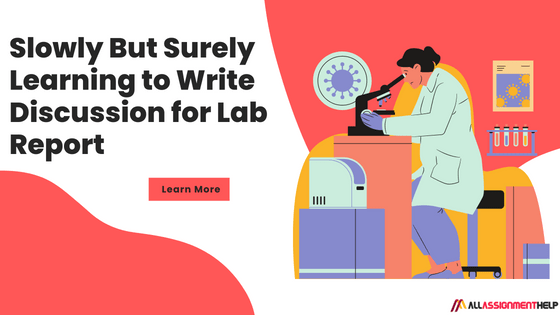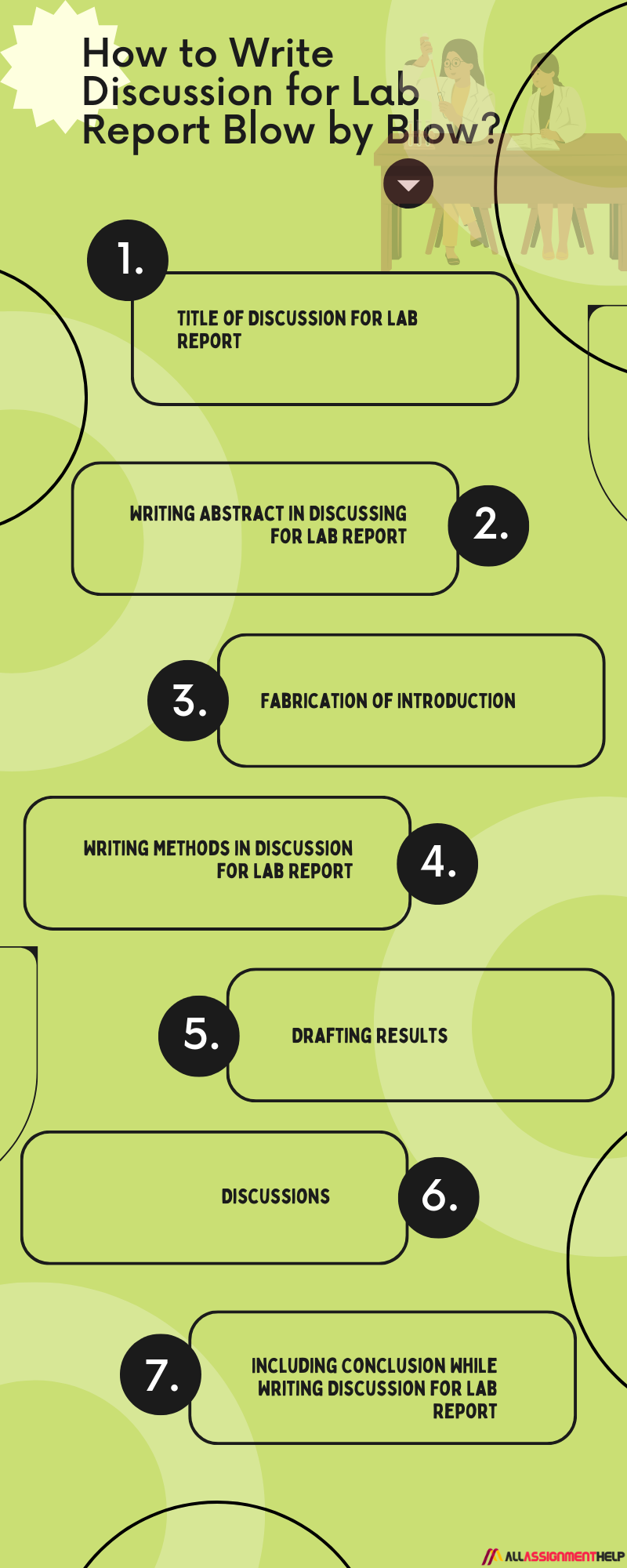“Self-Belief and hard work will always earn you success.” These are the words said by Virat Kohli and I do agree with him. If we practice the above things, we can get victory. Now If we jump to academics then my today’s blog will help you write a discussion for a lab report. First I would suggest you close your eye and think about what you know about this topic. Gather all your knowledge and then start going through this content. I can assure you that, this process will help you grab the knowledge you want faster.
First thing first, the learning process is divided into theoretical and practical components here. The theory consists of lectures and the practice consists of laboratory and independent work based on the material covered in one course. However, in this blog by allassignmenthelp.co.uk you are going to learn a lot about this topic.
So, what are you waiting for, let’s get going…
Discussion for Lab report: Introduction
Students may become exhausted while listening to and attempting to understand a large amount of new information during lectures. That is why laboratory or independent assignments are more exciting. The reason is that they combine knowledge testing and gaining extensive experience on the subject. The discussion section is the most important part of writing a lab report.
In general, lab reports are the most common type of written assignment for the following subjects:
- Engineering
- Biology
- Chemistry
- And other disciplines.
Furthermore, you can also check out Relevant Nursing Research Proposal Topics and choose according to your interest. You will almost certainly come across one during your college or university studies. While it is frequently overlooked, it significantly improves grades.
However, it is necessary to understand these things:
- How to write a proper report
- What structure should be followed
- Which sources should be used
- And so on.
Without further ado, here is some information you should be aware of prior to writing it which I will mention in the other section. After that, we will look at how to write a discussion for lab report.
What Should Be Included in the Discussion for Lab Report?
Let us briefly know about what can be included in the discussion for lab report:
- The discussion section of a lab report frequently begins with a statement. It is about whether the findings in the results section support the expected findings stated in the hypothesis.
- This comparison is critical because returning to a hypothesis is essential for scientific thinking.
- The statement of support or non-support then leads to the next logical issue, an explanation of why the hypothesis was or was not supported by the data received.
- The explanation may concentrate on scientific reasoning that supported the original hypothesis.
- As well as changes or errors in the experimental procedure and how they may have affected the results.
- Furthermore, discussion allows for the comparison of results with other people’s research.
When considering how to write the best discussion for a lab report, it is best to consider what this paper type entails.
There is a question… “What does it mean?”
Therefore, the above question can greatly assist you in writing your research proposal and your argument. In some ways, explaining the significance of the experiment should be done during the discussion.
How to Write Discussion for Lab Report Blow by Blow?
So, Have you established what this whole thing is yet? Now let’s talk about how to properly conduct discussion for lab report. Consider the following steps when writing your lab report to better answer the question of how to make a discussion for lab report.
Now focus on the structure below very strictly:
Title of Discussion for Lab Report
- The title of your lab report provides the first impression.
- Effective titles communicate the topic and/or findings of your study in specific terms.
- Make a title that expresses the main focus or purpose of your research.
- It does not have to be original or thought-provoking.
- However, it must be informative.
Writing Abstract in Discussing for Lab Report
- An abstract is a summary of a lab report that is around 300 words long.
- It should give readers a condensed version of the research objectives, methods and materials used, main findings, and final conclusion.
- Consider it a sneak peek at your full lab report for readers.
- Write the abstract last, in the past tense, after you’ve completed all of the other sections of your report.
- So you can summarise each section succinctly.
Fabrication of Introduction
The introduction to your lab report should set the stage for your experiment. Directing structure is one way to write your introduction.
Follow the steps below:
- Begin with a broad, general research topic.
- Focus your research on a specific topic.
- Finish with a specific research question.
Begin by introducing your research topic and explaining why it is important in a broad real-world or theoretical context. Describe previous research on your topic and how your study may confirm, expand, or fill a gap in the research field.
Also Read: 5 Mistakes Students Make while Researching on the Internet
Some More Tips and Tricks For Writing Introduction WHile Discussing for Lab Report
- Move from the broad to the specific – from a research problem to the specifics of your experiment.
- Your introduction doesn’t have to be prolonged. But, it should be arranged into a few paragraphs or with subheadings like “Research Context” or “Research Aims.”
- Engage your reader by answering the following questions: “What did I do?” “Why should my reader be concerned?”
- Clarify the connections between the problem and the solution, the research question and the research design. And, the prior research and the specifics of your experiment.
- Outline your hypotheses to express your main research goals and expectations.
- Selecting studies to cite and the amount of detail to include should be selective, not exhaustive. In general, the more relevant an article is to your research, the more space it deserves and the later it appears in the introduction.
- Inquire with your instructor about whether you should summarise results and/or conclusions in the Introduction.
- The experiment is already complete. When discussing the, use the past tense.
Writing Methods in Discussion for Lab Report
- A laboratory report The method section describes the procedures you used to collect and analyse data.
- Provide enough information for others to follow or evaluate your procedures.
- This section should be written in the past tense.
- If you must include lengthy lists of procedures or materials.
- Put them in the Appendices section but refer to them in the text.
- You should describe your experimental design, subjects, materials, and specific data collection and analysis procedures.
Drafting Results
- You should include the results of any statistical analysis procedures you performed in your results section.
- You should clearly state how the results of statistical tests support or refute your initial hypotheses.
The following are the main findings:
- Any descriptive statistics.
- Statistical test result.
- The importance of the test results.
- Approximate of standard fallacy or convicting intervals.
These findings can be presented in the text as well as in tables and figures. Use text to highlight a few key results, but present large sets of numbers in tables or graphs to demonstrate relationships between variables. Therefore, you should also give some time to self managment.
Discussions
The Discussion section will assist you in demonstrating your understanding of the experimental process as well as your critical thinking abilities.
You can do the following in this section:
- Expound your findings
- Collate your results to your presupposition.
- Interpreting your results entails explaining how your findings help you answer your main research question.
- Report whether your findings support your hypotheses.
- Determine any potential sources of experimental error.
- Compare your findings to those of other studies and explain any significant differences.
- Explain any unpredicted outcomes.
- An effective Discussion section will also highlight the strengths and limitations of a study.
- Make recommendations for future research.
Including Conclusion While Writing Discussion for Lab Report
- The final section of your lab report should be your conclusion.
- Here, you’ll summarise your experiment’s findings.
- Include a brief overview of the study’s strengths and limitations.
- As well as the implications for future research.
- Some lab reports may skip the Conclusion section because it overlaps with the Discussion section.
- But, you should consult with your instructor first.
Well, writing a lab report can become a handful for many students. But you can always go for professional help. They can make your burden less and also help you manage other activities.
Points To Remember
- What you should understand is that when you write a discussion, there is a purpose behind the argument.
- The goal of the discussion is to interpret the results, which means to explain, analyse, and compare them.
- This section is frequently the most important because it allows the researcher to step back and take a broader view of the experiment.
- Do not discuss any outcomes that are not presented in the results section.
- Furthermore, through this section, students can demonstrate their understanding of the experiment in greater depth than they could after performing it.
- This section focuses on the question “What is the significance or meaning of the results?”
- And, attempts to answer it as fully as possible, mentioning data and research findings along the way.
Winding-Up
If you can answer those questions without using our lab or book report writing services and present them scientifically, your discussion will be complete and ready. Now you won’t have to worry about how to make a discussion for lab report. Furthermore, you can always turn to our service for help with discussion writing and receive professional assistance from the best academic experts. This solution is intended for students who lack the necessary knowledge or environment to complete lab reports on time.
About Us!
We also have something for students who struggle to write good assignments in their traditional learning method. There are numerous high-quality and cheap assignment help available on the internet. As a result, you can contact any of them for reliable assistance. Furthermore, there are numerous advantages to using such services. It improves your academic performance and helps you score higher. The ultimate benefit, however, is that it gives you enough time to focus on learning new skills and developing new knowledge.
Frequently Asked Questions
| Question- What is a lab report? Answer- In general, lab reports are the most common type of written assignment for the following subjects; engineering, biology, chemistry and other disciplines. |
| Question- What Should Be Included in the Discussion for Lab Report? Answer- The discussion section of a lab report frequently begins with a statement. It is about whether the findings in the results section support the expected findings stated in the hypothesis. This comparison is critical because returning to a hypothesis is essential for scientific thinking. |

